Neighbourhood Picnic
Our Lives Stand Opposite Their Wars. From Lavapiés to the World
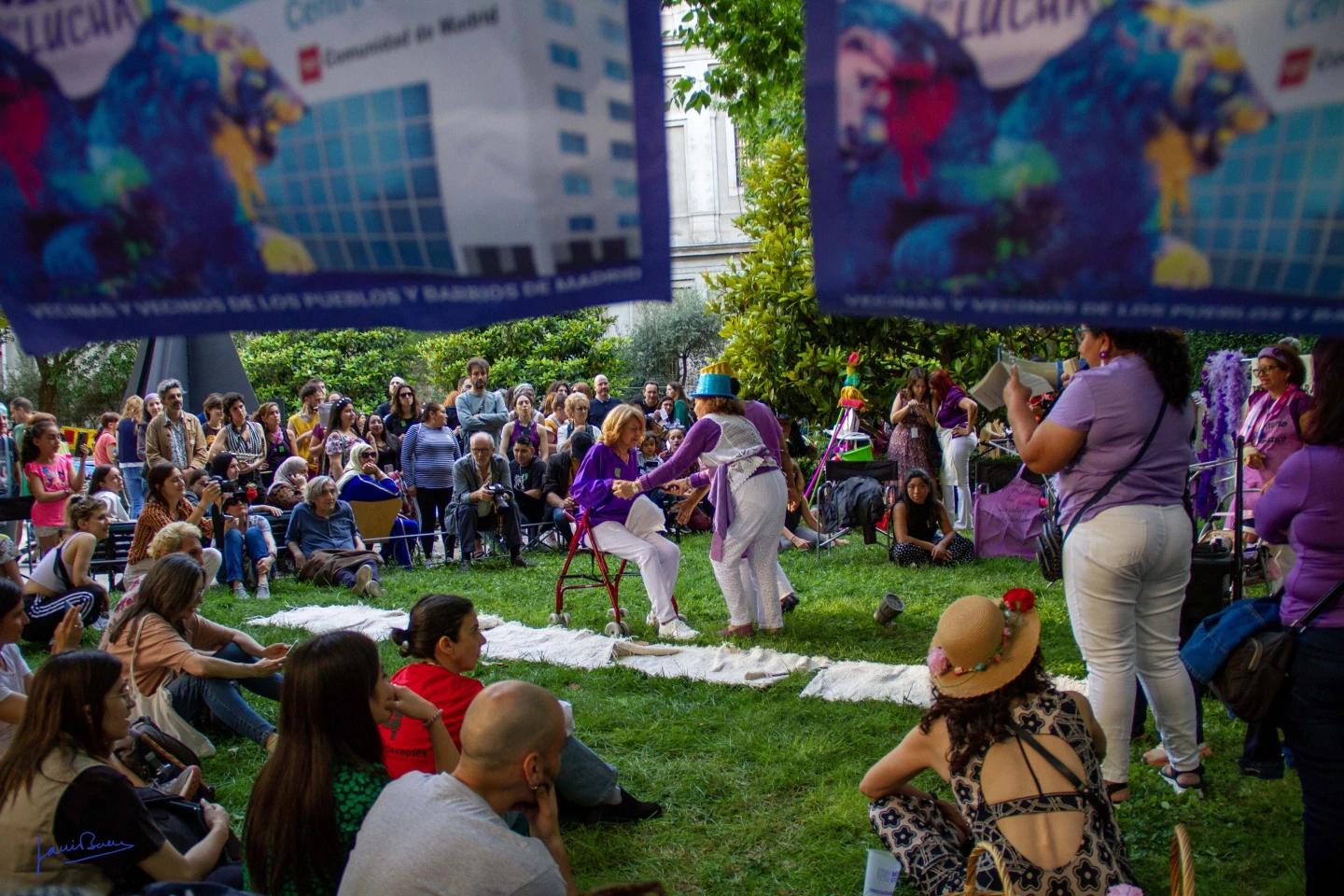
Neighbourhood Picnic. Re-enchanting Lavapiés, Museo Reina Sofía Garden, 2023. Photograph: Adriana Fernández García
Held on 08 Jun 2024
Once again, for another year, the Museo Situado assembly invites all residents and communities from Madrid’s Lavapiés neighbourhood to pervade the Museo Reina Sofía, inhabiting its spaces and transforming its Garden at the Neighbourhood Picnic. In short, a chance to encounter, celebrate and vindicate the struggles, rights and desires that mobilise them every day.
Before a hegemonic economic, political and cultural system which, paraphrasing anthropologist and eco-feminist Yayo Herrero, has waged war on life, this sixth edition of the Neighbourhood Picnic is a call to reaffirm lives opposite the armed conflicts spreading around the world and the systemic violence and injustices which perforate all aspects of society. Thus, under the slogan Our Lives Stand Opposite Their Wars. From Lavapiés to the World, this day stresses the urgent need to re-situate life at the centre of everything, recognising the framework of interdependencies and mutual care that will allow us to advance towards common horizons.
The protests and campaigns that structure the day fall within three main strands. Firstly, Against All Borders, which denounces the physical and symbolic barriers that limit rights and exercise different forms of violence, condensing initiatives such as Regularisation Now; No to the European Pact on Migration and Asylum (PEMA); Against Police Violence in Lavapiés; Homeless Census. Voter Registration for All; and the campaign to make the professional illnesses of domestic and care workers more visible.
The second strand, The Right to Decent Housing for All, rallies the defence of the Lavapiés neighbourhood to oppose real estate speculation, gentrification and the escalation of tourism that drives out and evicts local residents.
Thirdly and finally, We Are Diverse, LGTBIQA+ Pride is a call to keep on spotlighting and defending the rights of sex-gender dissidences that inhabit, care for and make the neighbourhood, and with causes that denote a scream for freedom against a heteropatriarchal system and hate speech.
Organised by
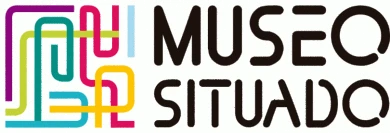
-
11am – 2pm Meeting point: Nouvel Building, main entrance
Kids’ Picnic
Gymkhana in the Museo
Games for children between the ages 6 of 13, organised by the collectives Hola Vecinas and Esta es una plaza.Play centre
A space for games and workshops aimed at children between the ages 6 of 13, organised by the collectives Hola Vecinas and Esta es una plaza.
In collaboration with: Escuela Savia and Savia with Tiān Mǎ Xíng Kōng. -
11:30am – 6pm Meeting point: Nouvel Building, main entrance
Situated Visits
Thirty-minute tours around the Collection by mediators from the Aissatou Ndiaye School of Situated Mediation Recorridos de 30 minutos por la Colección a cargo de l+s mediador+s de la Escuela de mediación situada Aissatou Ndiaye.
11:30am, in Bengali
12pm, in Spanish
1pm, in Wolof
5pm, in Darija -
12pm – 2pm Nouvel Building, Study Centre, Classroom 2
Wikipedia and Iberian Blackness. Publishing Workshop
FormAn encounter aimed at sparking creativity and improving Wikipedia content on people and concepts related to Blackness. Tania Safura Adam Mogne, from the Black Spain project, and Silvia Ramírez, from La Parcería, will participate in the workshop, which is organised with Wikimedia España inside the framework of the Seminar Black Iberian Studies from the Museo Reina Sofía’s Study Programme, Connective Tissue.
-
5pm - 6:30pm Nouvel Building, Auditorium 200 and online platform
Capitalism's War Against Reproduction. Palestine and Beyond
Encounter with Silvia Federici
Online platformEncounter with philosopher and feminist activist Silvia Federici, organised by Museo Situado and La Laboratoria. The Space for Feminist Research.
Evening snack organised by Tómate Algo and Valiente Bangla in the Sabatini Building Garden from 6pm
-
6pm – 9pm Meeting point: Sabatini Building, main entrance
Play Centre
A space for play and workshops, facilitated by Esta es Una Plaza
-
7pm – 8pm Sabatini Building, main entrance and Garden
The Political-Performative Actions of the Museo Situado Collectives
—Supported by Fanfarria Transfeminista
7pm Activation of the strand Against All Borders
In a context where physical and symbolic barriers are proliferating around the world, this activation shows its support for the campaigns Regularisation Now; No to the European Pact on Migration and Asylum (PEMA); Against Police Violence in Lavapiés; Homeless Census. Voter Registration for All and advocates the recognition of the professional illnesses of domestic and care workers. y reivindica el reconocimiento de las enfermedades profesionales de las trabajadoras del hogar y cuidados.7:15pm Activation of the strand The Right to Decent Housing for All
Opposite a real estate model that is changing and posing a threat to Madrid’s Lavapiés neighbourhood, collectives and local residents speak out against evictions, speculation and the urgent need to guarantee access to decent housing.7:30pm Activation of the strand We Are Diverse, LGTBIQA+ Pride
With the advance of the far right and hate speech, there is a need to keep on defending the rights of LGTBIQA+ people and collectives. This activation vindicates the pride of sex-gender dissidences that rebel against the heteropatriarchal system. -
7:45pm – 10pm Sabatini Building, main entrance and Garden
Live Music and Dance
With the MCs Dolores Galindo and Abdoulaye Thiaw
7:45pm Welcome conducted by Amanda de la Garza (deputy artistic director of the Museo Reina Sofía) and Lucía López (Hola Vecinas)
8pm Recognition for students from Museo Situado Schools
8:15pm Presentation of Bollywood Dance Dostana
8:30pm Kulumbá
9pm La Tom son

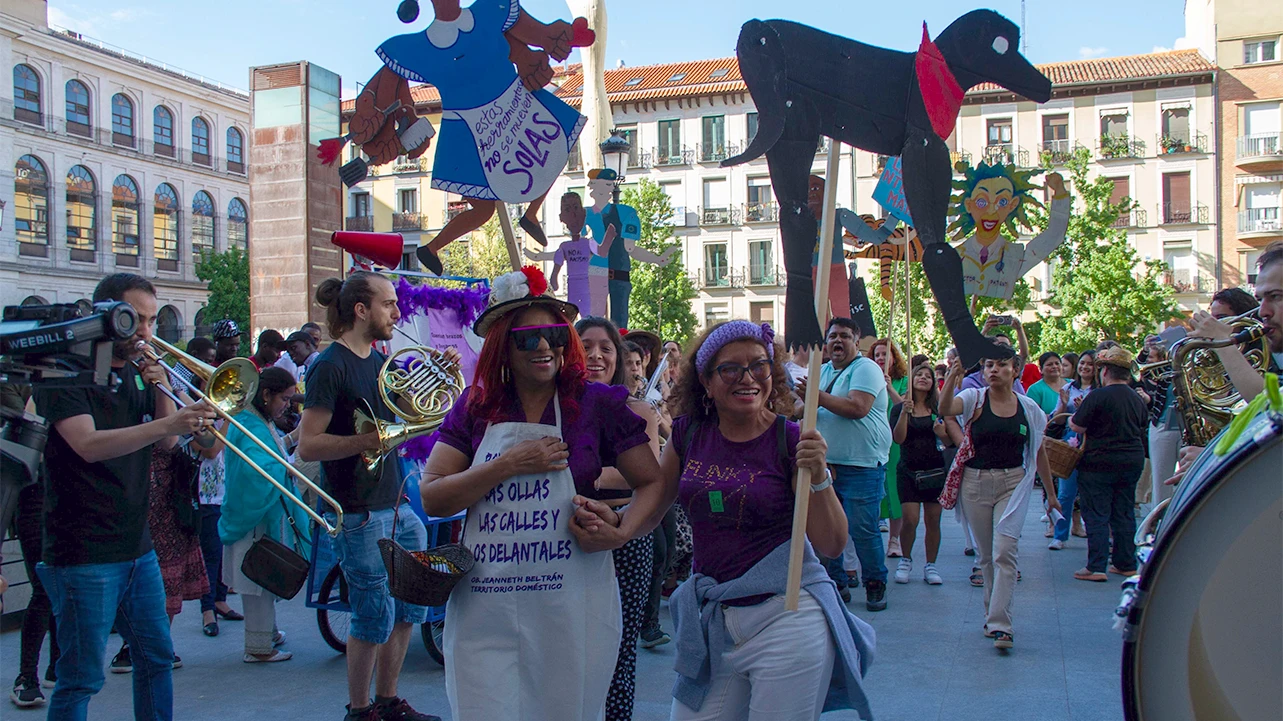
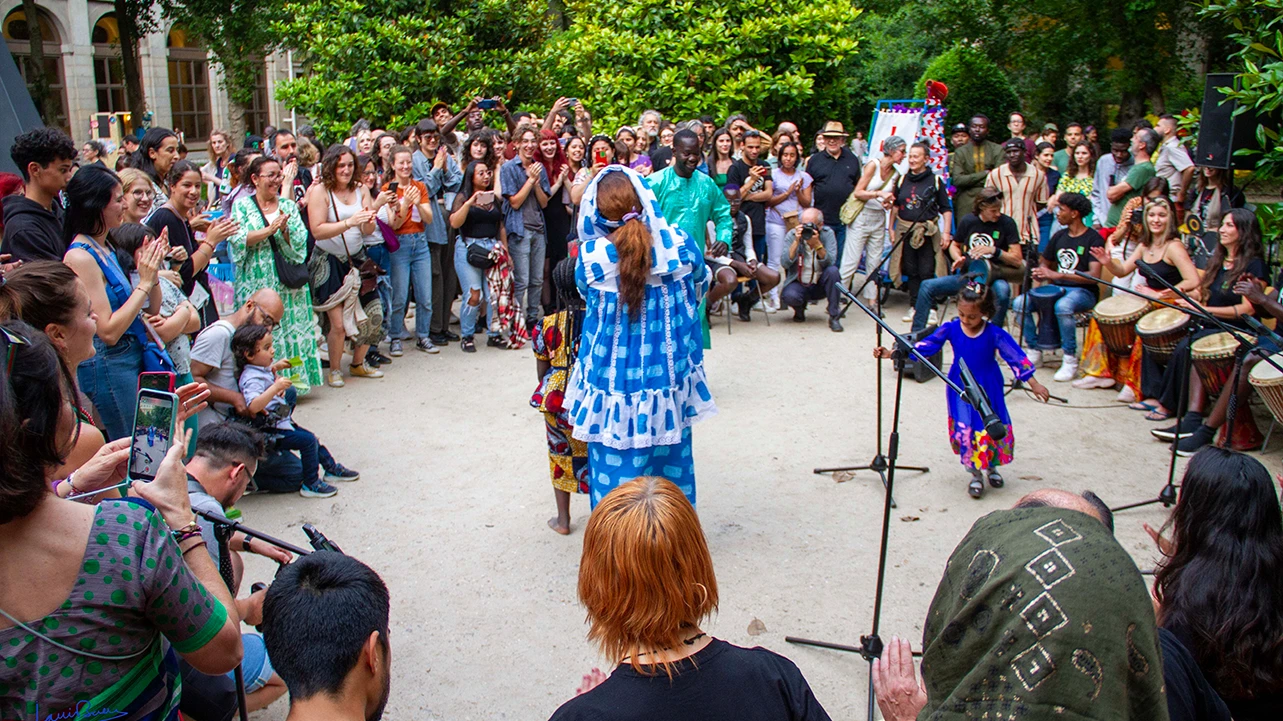
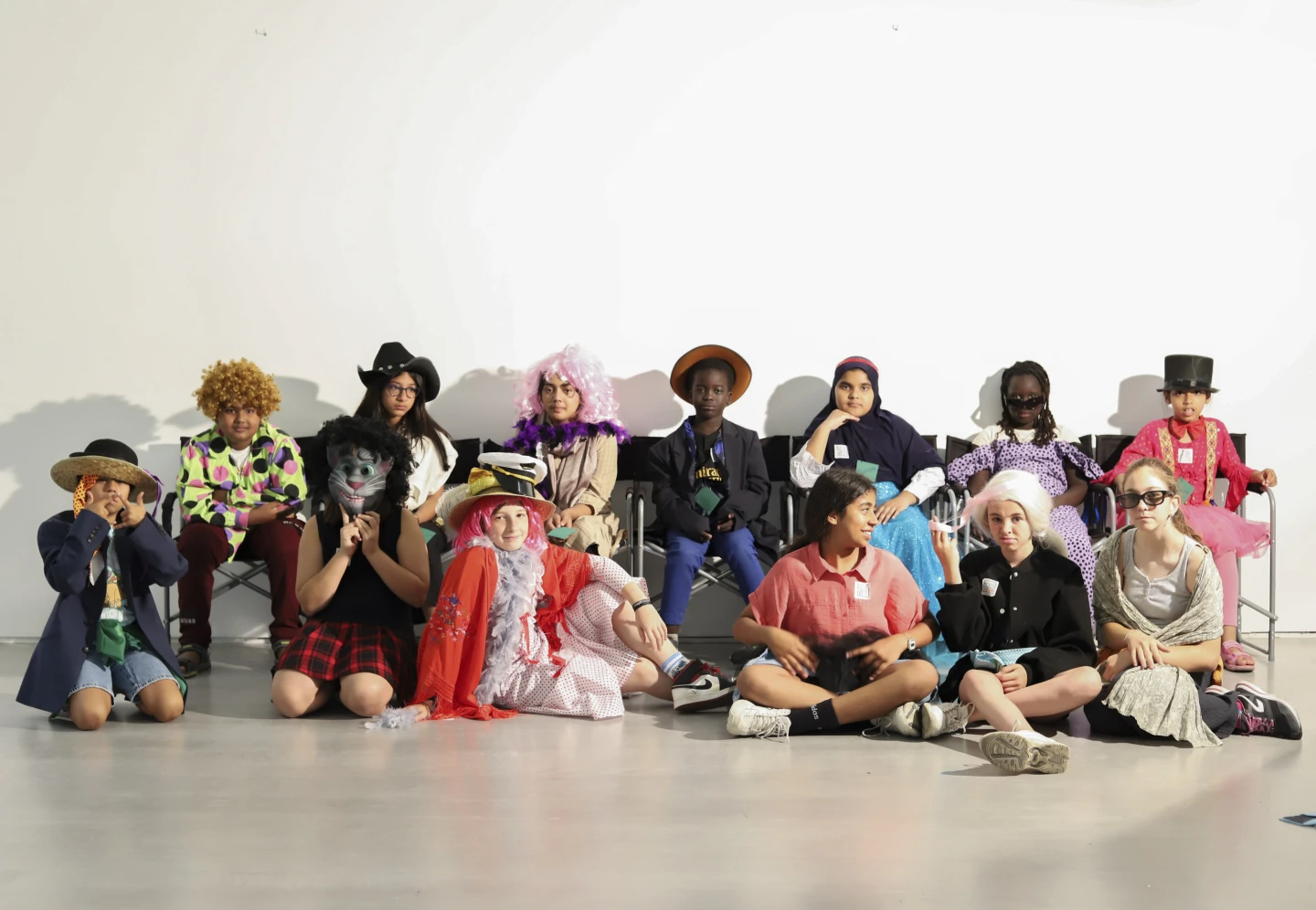


Más actividades

Difficulty. Forms and Political Effects of Deviation in Writing and Contemporary Art
23 February – 14 December 2026 – Check programme
Difficulty. Forms and Political Effects of Deviation in Writing and Contemporary Art is a study group aligned towards thinking about how certain contemporary artistic and cultural practices resist the referentiality that dominates the logics of production and the consumption of present-day art. At the centre of this proposal are the concepts of difficulty and deviation, under which it brings together any procedure capable of preventing artistic forms from being absorbed by a meaning that appears previous to and independent from its expression. By ensuring the perceptibility of their languages, difficulty invites us to think of meaning as the effect of a signifying tension; that is, as a productive and creative activity which, from the materiality of art objects, frees aesthetic experience from the representational mandate and those who participate in it from the passiveness associated with tasks of mimesis and decoding.
The economy of the referential norm translates the social logic of capitalism, where insidious forms of capturing subjectivity and meaning operate. In the early 1980s, and adopting a Marxist framework, poet Ron Silliman highlighted how this logic entailed separating language from any mark, gesture, script, form or syntax that might link it to the conditions of its production, rendering it fetichised (as if without a subject) and alienating its users in a use for which they are not responsible. This double dispossession encodes the political strategy of referential objectivity: with no subject and no trace of its own consistency, language is merely an object, that reality in which it disappears.
The political uses of referentiality, more sophisticated today than ever before, sustain the neoliberal-extractivist phase of capitalism that crosses through present-day societies politically, economically and aesthetically. Against them, fugitive artistic practices emerge which, drawing from Black and Queer studies and other subaltern critical positions, reject the objective limits of what exists, invent forms to name what lies outside what has already been named, and return to subjects the capacity to participate in processes of emission and interpretation.
Read from the standpoint of artistic work, the objective capture of referentiality may be called transparency. Viewed from a social contract that reproduces inequality in fixed identity positions, transparent in this objectivity are, precisely, the discourses that maintain the status quo of domination. Opposite the inferno of these discourses, this group aims to collectively explore, through deviant or fugitive works, the paradise of language that Monique Wittig encountered in the estranged practices of literature. For the political potency of difficulty — that is, its contribution to the utopia of a free language among equals — depends on making visible, first, its own deviations; from there, the norm that those deviations transgress; and finally, the narrowness of a norm which in no way exhausts the possibilities ofsaying, signifying, referring and producing a world.
From this denouncement of referential alienation, fetishisation and capture, Difficulty. Forms and Political Effects of Deviation in Writing and Contemporary Art turns its attention to the strategies of resistance deployed by contemporary artists and poets. Its interest is directed towards proposals as evidently difficult or evasive as those of Gertrude Stein, Lyn Hejinian, Theresa Hak Kyung Cha, Kameelah Janan Rasheed, Kathy Acker, María Salgado and Ricardo Carreira, and as seemingly simple as those of Fernanda Laguna, Felix Gonzalez Torres and Cecilia Vicuña, among other examples that can be added according to the desires and dynamics of the group.
The ten study group sessions, held between February and December, combine theoretical seminars, work with artworks from the Museo Reina Sofía’s Collections and exhibitions, reading workshops and public programs. All these formats serve as spaces of encounter to think commonly about certain problems of poetics — that is, certain political questions — of contemporary writing and art.
Difficulty. Forms and Political Effects of Deviation in Writing and Contemporary Art inaugurates the research line Goodbye, Representation, through which the Museo Reina Sofía’s Studies Directorship seeks to explore the emergence of contemporary artistic and cultural practices which move away from representation as a dominant aesthetic-political strategy and redirect their attention toward artistic languages that question the tendency to point, name and fix, advocating instead for fugitive aesthetics. Over its three-year duration, this research line materializes in study groups, seminars, screenings and other forms of public programming.

Institutional Decentralisation
Thursday, 21 May 2026 – 5:30pm
This series is organised by equipoMotor, a group of teenagers, young people and older people who have participated in the Museo Reina Sofía’s previous community education projects, and is structured around four themed blocks that pivot on the monstrous.
This fourth and final session centres on films that take the museum away from its axis and make it gaze from the edges. Pieces that work with that which is normally left out: peripheral territories, unpolished aesthetics, clumsy gestures full of intent. Instead of possessing an institutional lustre, here they are rough, precarious and strange in appearance, legitimate forms of making and showing culture. The idea is to think about what happens when central authority is displaced, when the ugly and the uncomfortable are not hidden, when they are recognised as part of the commons. Film that does not seek to be to one’s liking, but to open space and allow other ways of seeing and inhabiting the museum to enter stage.

Intergenerationality
Thursday, 9 April 2026 – 5:30pm
This series is organised by equipoMotor, a group of teenagers, young people and older people who have participated in the Museo Reina Sofía’s previous community education projects, and is structured around four themed blocks that pivot on the monstrous.
The third session gazes at film as a place from which to dismantle the idea of one sole history and one sole time. From a decolonial and queer perspective, it explores films which break the straight line of past-present-future, which mix memories, slow progress and leave space for rhythms which customarily make no room for official accounts. Here the images open cracks through which bodies, voices and affects appear, disrupting archive and questioning who narrates, and from where and for whom. The proposal is at once simple and ambitious: use film to imagine other modes of remembering, belonging and projecting futures we have not yet been able to live.

Remedios Zafra
Thursday March 19, 2026 - 19:00 h
The José Luis Brea Chair, dedicated to reflecting on the image and the epistemology of visuality in contemporary culture, opens its program with an inaugural lecture by essayist and thinker Remedios Zafra.
“That the contemporary antifeminist upsurge is constructed as an anti-intellectual drive is no coincidence; the two feed into one another. To advance a reactionary discourse that defends inequality, it is necessary to challenge gender studies and gender-equality policies, but also to devalue the very foundations of knowledge in which these have been most intensely developed over recent decades—while also undermining their institutional support: universities, art and research centers, and academic culture.
Feminism has been deeply linked to the affirmation of the most committed humanist thought. Periods of enlightenment and moments of transition toward more just social forms—sustained by education—have been when feminist demands have emerged most strongly. Awareness and achievements in equality increase when education plays a leading social role; thus, devaluing intellectual work also contributes to harming feminism, and vice versa, insofar as the bond between knowledge and feminism is not only conceptual and historical, but also intimate and political.
Today, antifeminism is used globally as the symbolic adhesive of far-right movements, in parallel with the devaluation of forms of knowledge emerging from the university and from science—mistreated by hoaxes and disinformation on social networks and through the spectacularization of life mediated by screens. These are consequences bound up with the primacy of a scopic value that for some time has been denigrating thought and positioning what is most seen as what is most valuable within the normalized mediation of technology. This inertia coexists with techno-libertarian proclamations that reactivate a patriarchy that uses the resentment of many men as a seductive and cohesive force to preserve and inflame privileges in the new world as techno-scenario.
This lecture will address this epochal context, delving into the synchronicity of these upsurges through an additional parallel between forms of patriarchal domination and techno-labor domination. A parallel in which feminism and intellectual work are both being harmed, while also sending signals that in both lie emancipatory responses to today’s reactionary turns and the neutralization of critique. This consonance would also speak to how the perverse patriarchal basis that turns women into sustainers of their own subordination finds its equivalent in the encouraged self-exploitation of cultural workers; in the legitimation of affective capital and symbolic capital as sufficient forms of payment; in the blurring of boundaries between life and work and in domestic isolation; or in the pressure to please and comply as an extended patriarchal form—today linked to the feigned enthusiasm of precarious workers, but also to technological adulation. In response to possible resistance and intellectual action, patriarchy has associated feminists with a future foretold as unhappy for them, equating “thought and consciousness” with unhappiness—where these have in fact been (and continue to be) levers of autonomy and emancipation.”
— Remedios Zafra

27th Contemporary Art Conservation Conference
Wednesday, 4, and Thursday, 5 March 2026
The 27th Contemporary Art Conservation Conference, organised by the Museo Reina Sofía’s Department of Conservation and Restoration, with the sponsorship of the Mapfre Foundation, is held on 4 and 5 March 2026. This international encounter sets out to share and debate experience and research, open new channels of study and reflect on conservation and the professional practice of restorers.
This edition will be held with in-person and online attendance formats, occurring simultaneously, via twenty-minute interventions followed by a five-minute Q&A.

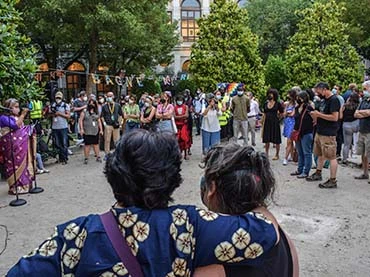


![Shuruq Harb. The Jump [El salto], Palestina, 2021. Cortesía de la artista](https://recursos.museoreinasofia.es/styles/small_landscape/public/Actividades/narrativas_desde_palestina._una_poetica_del_territorio_0.jpg.webp)